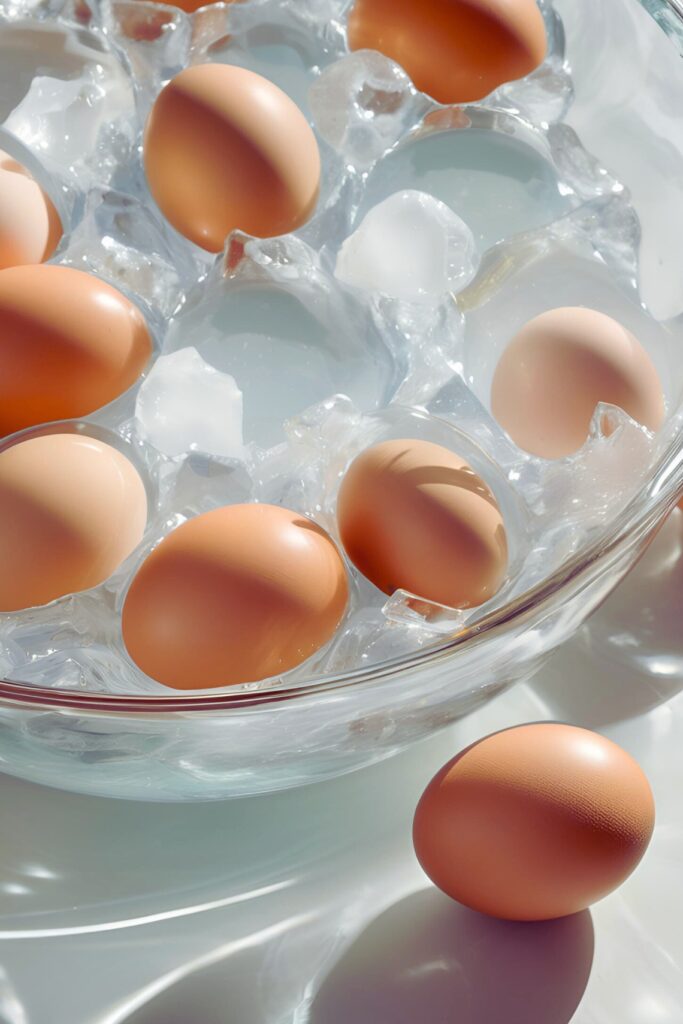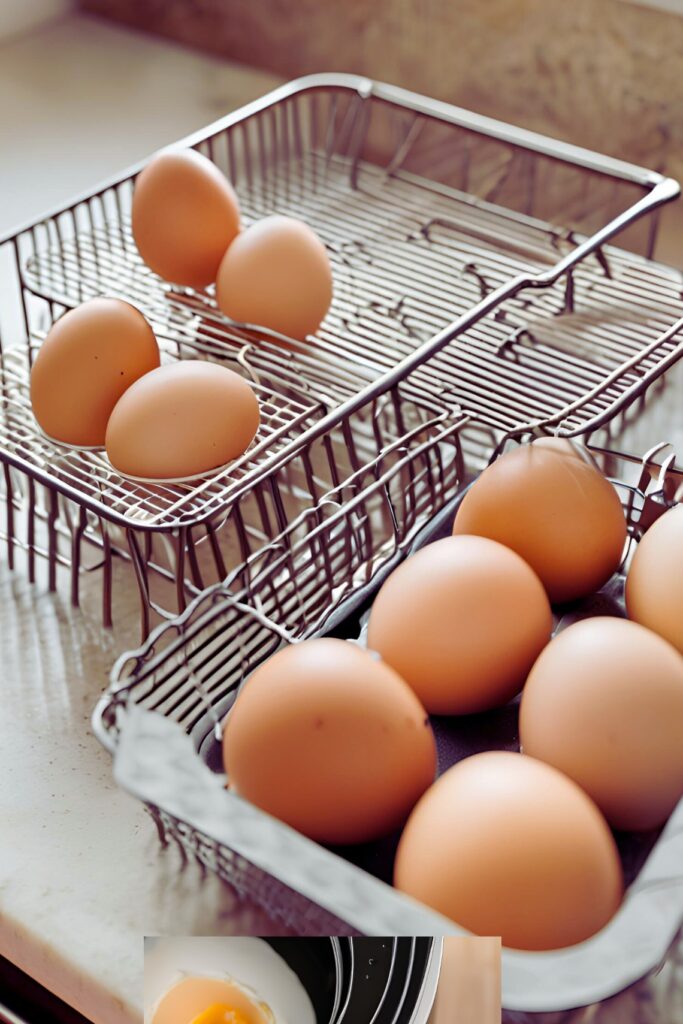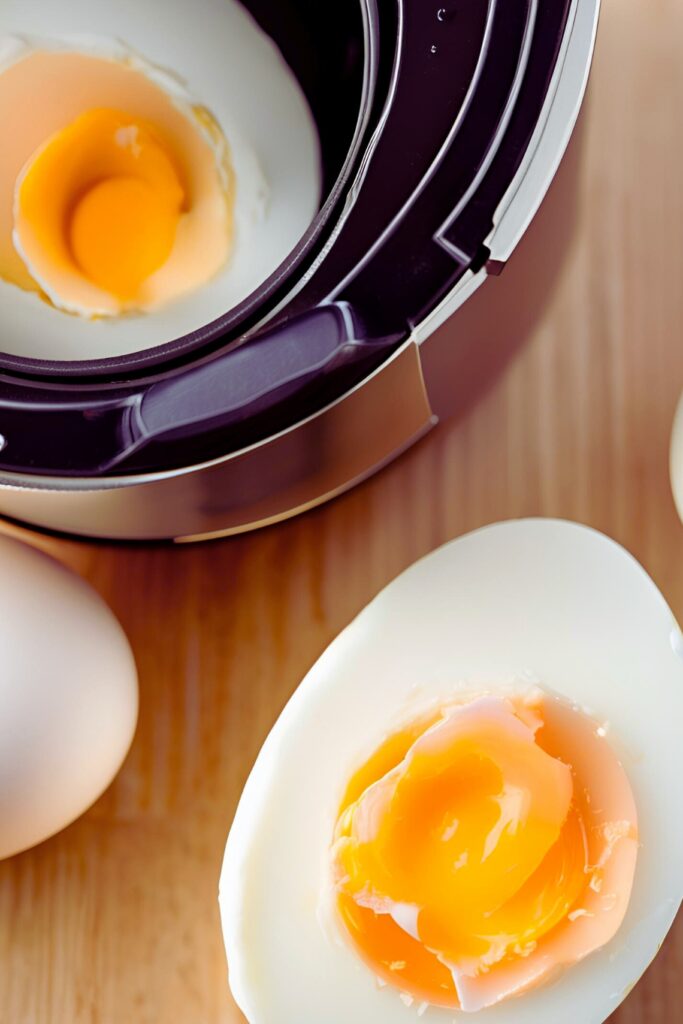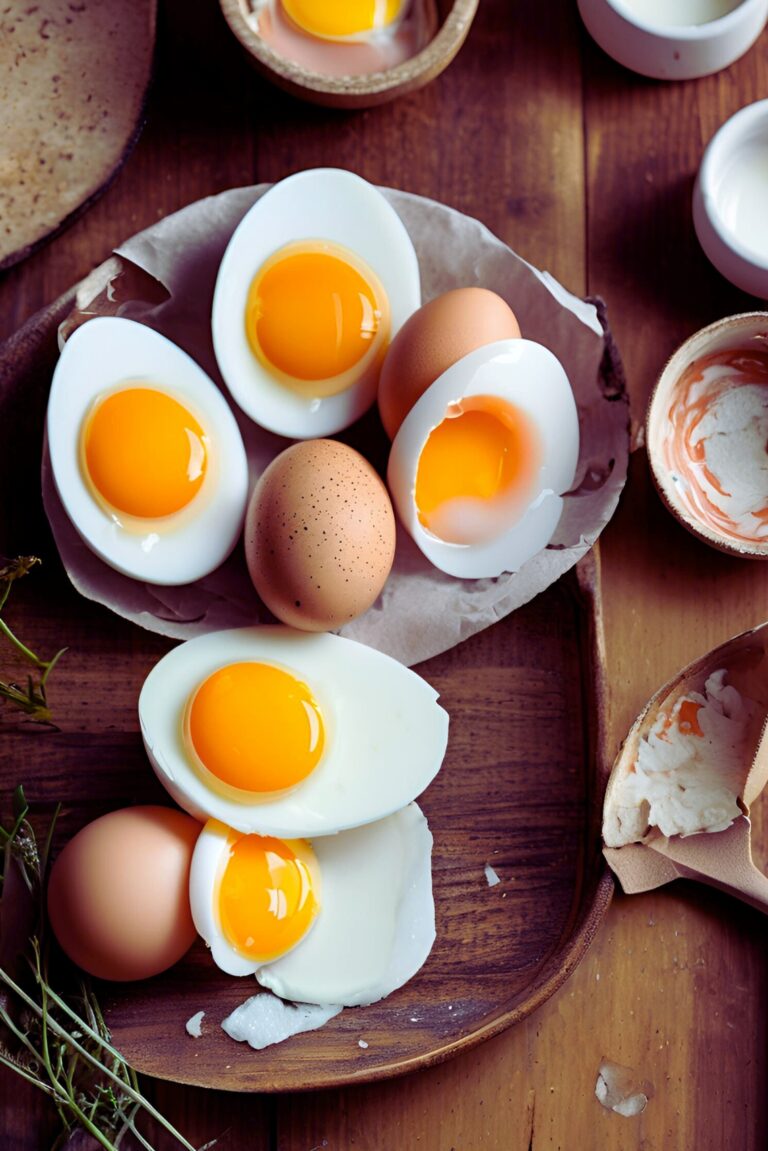In recent years, air fryers have become kitchen staples for their ability to create delicious meals quickly and with minimal oil. Among the many recipes people experiment with, cooking eggs in an air fryer has gained immense popularity. This cooking method promises a convenient way to achieve the perfect hard-boiled egg without the need for boiling water. However, a recurring issue arises when it comes to peeling these eggs. The shells often stubbornly cling to the egg whites, making peeling a frustrating task.
As air fryer recipes continue to dominate social media platforms and culinary blogs, understanding the science behind egg peeling challenges becomes essential. Here’s what makes air fryer eggs so tricky to peel compared to their traditionally boiled counterparts.
For a deeper dive into this topic, check out our detailed guide on why air fryer eggs are so hard to peel.”
2. Science of Cooking Eggs
Cooking eggs, regardless of the method, is a delicate process influenced by their unique composition. Eggs consist of:
- Egg whites (albumen): High in protein, they coagulate when heated.
- Egg yolks: Rich in fats and proteins, they become firmer as temperature rises.
- Membranes: Located between the eggshell and the egg white, these play a key role in shell adhesion.
When heated, the egg white proteins denature and form a tight bond with the inner shell membrane. The extent of this bond depends on the cooking method and temperature.
3. Comparison Between Boiled Eggs and Air Fryer Eggs
Boiled eggs and air fryer eggs differ significantly in their preparation:
- Boiled eggs: Cooked in water, which surrounds the eggs evenly with heat and generates steam that helps loosen the shell.
- Air fryer eggs: Heated by circulating hot air, often lacking the steam that aids in peeling.
This difference in heat application directly affects how tightly the shell membrane adheres to the egg white.
4. Shell Adhesion in Eggs
One of the biggest factors contributing to peeling difficulty is the bond between the shell and the egg white. This bond is affected by:
- The membrane structure: A thin layer that sticks to the egg white during the cooking process.
- Heat and moisture: Steam from boiling water helps separate the shell and membrane, making it easier to peel boiled eggs.
In contrast, air fryer eggs often lack the steam necessary to loosen this bond, leading to shells that stick.
5. Factors Influencing Egg Peeling Difficulty
The age of the egg plays a crucial role in determining how easily it can be peeled. Here’s why:
- Fresh eggs: Their pH is lower, causing the egg white to bond more strongly to the membrane.
- Older eggs: Have a higher pH, weakening the bond and making peeling easier.
When cooking with an air fryer, even fresh eggs tend to be harder to peel due to the absence of steam.
6. The Effect of Air Fryer Heat on Eggshells
Air fryers use high temperatures to cook food quickly. While this is great for achieving crispy textures in many dishes, it presents challenges for eggs:
- Direct heat exposure: Causes the egg proteins to over-tighten, increasing shell adhesion.
- No moisture retention: Unlike boiling, air frying doesn’t create the humidity needed to relax the membrane.
These conditions often result in eggshells that stubbornly cling to the cooked egg white.
7. Role of Steam in Easier Egg Peeling
The role of steam cannot be overstated when it comes to cooking eggs. When eggs are boiled:
- Steam infiltrates the shell and creates a small gap between the membrane and the egg white.
- This gap makes peeling significantly easier.
In air fryers, the lack of steam means no such gap forms, making the peeling process much harder.

8. Air Fryer Temperature Control Issues
Air fryers are known for their versatility but can sometimes produce uneven heat distribution. This inconsistency affects egg cooking in the following ways:
- Hot spots: Can overcook one part of the egg while undercooking another.
- Variable adhesion: Makes peeling even more unpredictable.
If you’re dealing with unevenly cooked eggs, troubleshooting the temperature settings of your air fryer is essential.
9. The Chemistry of Egg Whites and Yolks
Cooking eggs in an air fryer alters the chemical composition of the egg whites and yolks:
- Whites: Become rubbery due to the high heat, increasing their stickiness to the membrane.
- Yolks: Can dry out, losing their creamy texture.
Understanding these changes can help you adjust your air fryer settings for better results.
10. Shell Cracking During Air Frying
Another common issue is shell cracking. Cracks allow air to seep into the egg, creating pockets that disrupt the cooking process. This not only affects the texture of the egg but also makes peeling harder.
Reasons for cracking include:
- Cooking at too high a temperature.
- Using eggs that are too cold (straight from the fridge) in a hot air fryer.
We’ve explored the science behind why air fryer eggs are notoriously hard to peel, including the effects of heat, lack of steam, and the role of egg membranes. Understanding these factors sets the stage for uncovering solutions and improving your air fryer egg game.
11. Common Mistakes When Using an Air Fryer for Eggs
Cooking eggs in an air fryer may seem straightforward, but a few common mistakes can lead to hard-to-peel shells:
- Overcooking: Extended cooking times at high temperatures can make the egg whites rubbery, increasing their adhesion to the shell.
- Skipping preheating: An unevenly heated air fryer results in inconsistent cooking, affecting the egg’s texture.
- No water addition: Unlike boiling, air frying lacks moisture, which is critical for easier peeling.
12. Techniques to Improve Air Fryer Egg Results
If peeling air fryer eggs has been a challenge, there are simple adjustments you can make:
- Add water: Place a small oven-safe bowl of water in the air fryer basket. This helps mimic the steam effect of boiling.
- Preheat the air fryer: Ensures consistent heat distribution.
- Experiment with temperatures: Start with 250°F (120°C) and gradually adjust to find the sweet spot.
These techniques help reduce shell adhesion and improve overall results.
To achieve perfectly cooked air fryer eggs every time, follow our step-by-step guide on how to make air fryer hard-boiled eggs.
13. Importance of Post-Cooking Treatments
Post-cooking methods are as critical as the cooking process itself when it comes to easy peeling. The ice bath method is particularly effective:
- Immediately after cooking, transfer the eggs to a bowl of ice water.
- Let them sit for 10-15 minutes. This rapid cooling contracts the egg, loosening the shell-membrane bond.
The ice bath not only improves peeling but also preserves the egg’s texture and flavor.

14. Best Practices for Cooking Eggs in Air Fryers
For consistently perfect air fryer eggs, follow these best practices:
- Choose the right temperature: Cook at 250°F–300°F (120°C–150°C) to avoid overcooking.
- Cook time: 13–17 minutes for medium to hard-cooked eggs.
- Use a wire rack: Elevates the eggs for better heat circulation.
By standardizing your process, you can achieve better results and reduce peeling frustrations.
15. Experimenting with Egg Types
Not all eggs are created equal. When using an air fryer, egg type and quality can impact peeling:
- Brown eggs vs. white eggs: No significant difference in peeling, but brown eggs often have thicker shells.
- Farm-fresh vs. store-bought eggs: Fresh eggs tend to be harder to peel due to their lower pH, while older eggs peel more easily.
For easier peeling, consider using eggs that are 7–10 days old.
16. Myth-Busting Egg Peeling Techniques
The internet is rife with egg-peeling hacks, but do they work for air fryer eggs? Let’s debunk a few:
- Tapping and rolling the egg: Effective for boiled eggs, but less so for air fryer eggs.
- Using vinegar or baking soda: While these can alter pH levels, they don’t compensate for the lack of steam in air frying.
- Peeling under running water: Helpful, but not a guaranteed solution for stubborn shells.
Stick to proven methods like the ice bath for best results.
17. User Reviews and Experiences with Air Fryer Eggs
Many users share their experiences with cooking eggs in air fryers. Common observations include:
- Positive reviews: Users love the convenience and consistency in cooking times.
- Complaints: Peeling remains a universal frustration, with many pointing to shell adhesion as the main culprit.
Experimentation and technique refinement are key to overcoming these challenges.
18. Comparing Air Fryer Eggs to Traditional Methods
Each cooking method has its pros and cons when it comes to making hard-boiled eggs:
Air Fryer Eggs
- Pros: Convenience, no need for boiling water, consistent cooking.
- Cons: Harder to peel, occasional cracking, limited steam.
Boiled Eggs
- Pros: Easier to peel, excellent texture.
- Cons: Requires monitoring and clean-up.
19. Tools to Enhance Air Fryer Egg Results
Investing in simple kitchen tools can improve your air fryer egg experience:
- Egg racks: Designed to hold eggs securely, ensuring even cooking.
- Silicone liners: Reduce direct contact with the fryer basket, minimizing cracks.
- Piercing tools: Create a small hole in the shell to allow air to escape, reducing cracks and adhesion.
These accessories are widely available and can help achieve better results.
20. Nutritional Differences in Air Fryer vs. Boiled Eggs
Cooking methods can slightly affect the nutritional profile of eggs:
- Boiled eggs: Retain more moisture, which preserves nutrients like vitamin D.
- Air fryer eggs: Can lose some moisture, slightly concentrating protein and fat content.
However, both methods are excellent for preserving the overall nutritional integrity of eggs. Eggs remain a powerhouse of protein, vitamins, and healthy fats regardless of the method used.
In this section, we explored practical solutions and adjustments to improve your experience with air fryer eggs. From post-cooking treatments like ice baths to the use of specialized tools, these tips can help minimize peeling frustration and enhance results.
21. Troubleshooting Common Air Fryer Egg Issues
Despite following best practices, you may still encounter challenges with air fryer eggs. Here’s how to troubleshoot common issues:
Hard-to-Peel Shells
- Solution: Ensure eggs are at room temperature before cooking. Use slightly older eggs (7–10 days old) for better peeling results.
Overcooked Eggs
- Solution: Reduce the cooking time by 1–2 minutes and check for doneness. Experiment with lower temperatures like 250°F (120°C).
Cracked Shells
- Solution: Avoid placing cold eggs directly in a preheated air fryer. Let them warm up to room temperature before cooking.
By identifying specific problems, you can fine-tune your method for perfect results every time.
22. Tips for Prepping Eggs Before Air Frying
Preparation is key to ensuring your air fryer eggs turn out well. Here are some pre-cooking tips:
- Wash and dry eggs: Removes debris that might interfere with cooking.
- Pierce the shell: Using a needle or egg piercer, create a small hole at the wide end of the egg. This allows air to escape and reduces cracking.
- Use consistent sizes: Cooking eggs of similar size ensures even results.
Prepping your eggs properly can significantly reduce the chances of peeling problems.
23. The Role of Water Content in Air Fryer Eggs
Moisture is a critical factor in egg cooking. Unlike boiling, air frying exposes eggs to dry heat, which can:
- Increase shell adhesion by dehydrating the membrane.
- Alter the texture of the egg white, making it more rubbery.
To counteract this, consider placing a small dish of water in the air fryer during cooking to create a humid environment.
24. The Influence of Eggshell Thickness
Eggshell thickness varies by breed, diet, and age of the chicken. Thicker shells are:
- Harder to crack and peel due to a stronger membrane.
- More common in brown eggs compared to white ones.
Understanding the natural properties of eggshells can help you choose the right eggs for air fryer cooking.
25. Popular Air Fryer Egg Recipes
Air fryers aren’t limited to hard-boiled eggs. Here are some creative recipes to try:
- Soft-boiled eggs: Cook at 250°F (120°C) for 8–10 minutes for a runny yolk.
- Egg bites: Whisk eggs with vegetables and cheese, then cook in silicone molds.
- Deviled eggs: Hard-cook the eggs in the air fryer, then prepare the filling for a quick snack.
Exploring new recipes allows you to maximize the potential of your air fryer.
26. Role of Cooling in Egg Peeling
Rapid cooling is one of the most effective ways to make eggs easier to peel. This process:
- Contracts the egg whites, creating a gap between the membrane and the shell.
- Prevents overcooking by halting the cooking process immediately.
Pro Tip: Add a pinch of salt or vinegar to your ice bath for an extra peeling advantage.
27. Egg Storage and Freshness for Air Fryer Cooking
The freshness of your eggs directly impacts peeling difficulty. To optimize your results:
- For easier peeling: Use eggs that have been stored for at least a week.
- For optimal texture: Store eggs in the fridge and bring them to room temperature before cooking.
Proper storage ensures your eggs are at their best for air fryer cooking.
28. Debunking Misconceptions About Air Fryer Eggs
Several misconceptions about air fryer eggs persist online. Let’s clarify a few:
- Myth: Air frying saves time compared to boiling.
Fact: Boiling is often faster, especially for large batches. - Myth: Air fryer eggs taste different.
Fact: The taste is identical, but the texture may vary due to dry heat.
Debunking these myths helps set realistic expectations for air fryer eggs.
29. Step-by-Step Guide for Perfect Air Fryer Eggs
Here’s a foolproof method for cooking eggs in an air fryer:
- Preheat the air fryer to 250°F (120°C).
- Place eggs on a wire rack or silicone liner.
- Cook for 13–17 minutes, depending on your desired doneness.
- Transfer immediately to an ice bath and let cool for 10 minutes.
- Peel under running water for best results.
This step-by-step approach minimizes peeling frustration and ensures consistent results.
30. Conclusion: Making Air Fryer Eggs Work for You
Cooking eggs in an air fryer can be a rewarding experience with the right techniques. While challenges like peeling difficulty and cracking shells are common, they can be addressed through careful preparation, proper temperature control, and post-cooking treatments.
By experimenting with different methods and tools, you’ll discover the joy of creating perfect air fryer eggs every time.

FAQs About Air Fryer Eggs
1. How can I stop my air fryer eggs from cracking?
To prevent eggs from cracking in an air fryer, ensure they’re not cold when placed in the basket. Let the eggs sit at room temperature for about 10–15 minutes before cooking. Additionally, avoid overcrowding the basket, as eggs bumping into each other can cause cracks. Lastly, start at a slightly lower temperature and increase gradually, which reduces the pressure on the shells.
2. Why does the age of eggs matter when peeling air fryer eggs?
Eggs that are a few days old are easier to peel because their pH increases over time, weakening the bond between the shell and the membrane. Fresh eggs, on the other hand, have a stronger bond, making peeling more difficult. If you’re planning to use fresh eggs, consider adding water to your air fryer or using the ice bath technique to help with peeling.
3. What’s the best way to achieve consistent cooking in an air fryer?
Preheating your air fryer is crucial for consistent cooking, as it ensures even heat distribution right from the start. Also, placing eggs on a wire rack allows hot air to circulate evenly around them. If your air fryer has hotspots, consider rotating the basket halfway through the cooking time to prevent uneven results.


